Aircall Alternatives
A direct comparison of 10 Aircall alternatives. We review features, pricing, and integrations to help you choose a replacement for your business.

Aircall is a popular phone system, and you may have chosen it for good reasons. It performs well for teams that need a simple setup and solid integrations with major CRMs. This makes it a straightforward choice for many sales and support departments.
However, some users report limitations like occasional call quality issues or a pricing model that doesn't scale well. We've analyzed the best Aircall alternatives, comparing their advantages and drawbacks based on G2 reviews to help you find a better fit. Let's get started.
Consider 11x for Digital Sales Workers
For sales efforts that need digital workers, consider 11x. The platform provides autonomous agents to handle specific sales tasks. This suggestion fits teams that want automation beyond a standard phone system.
The 11x platform is a GTM solution that uses AI agents to manage the sales process. An agent named Alice finds prospects, handles outreach on email and LinkedIn, and maintains the CRM. A second agent, Julian, qualifies inbound leads and books meetings, consolidating tools for data enrichment and outreach.
Aircall Alternatives
Here is a detailed breakdown of the top Aircall alternatives. We analyze each option based on pricing, features, and how their pros and cons stack up against Aircall.
1) RingCentral MVP
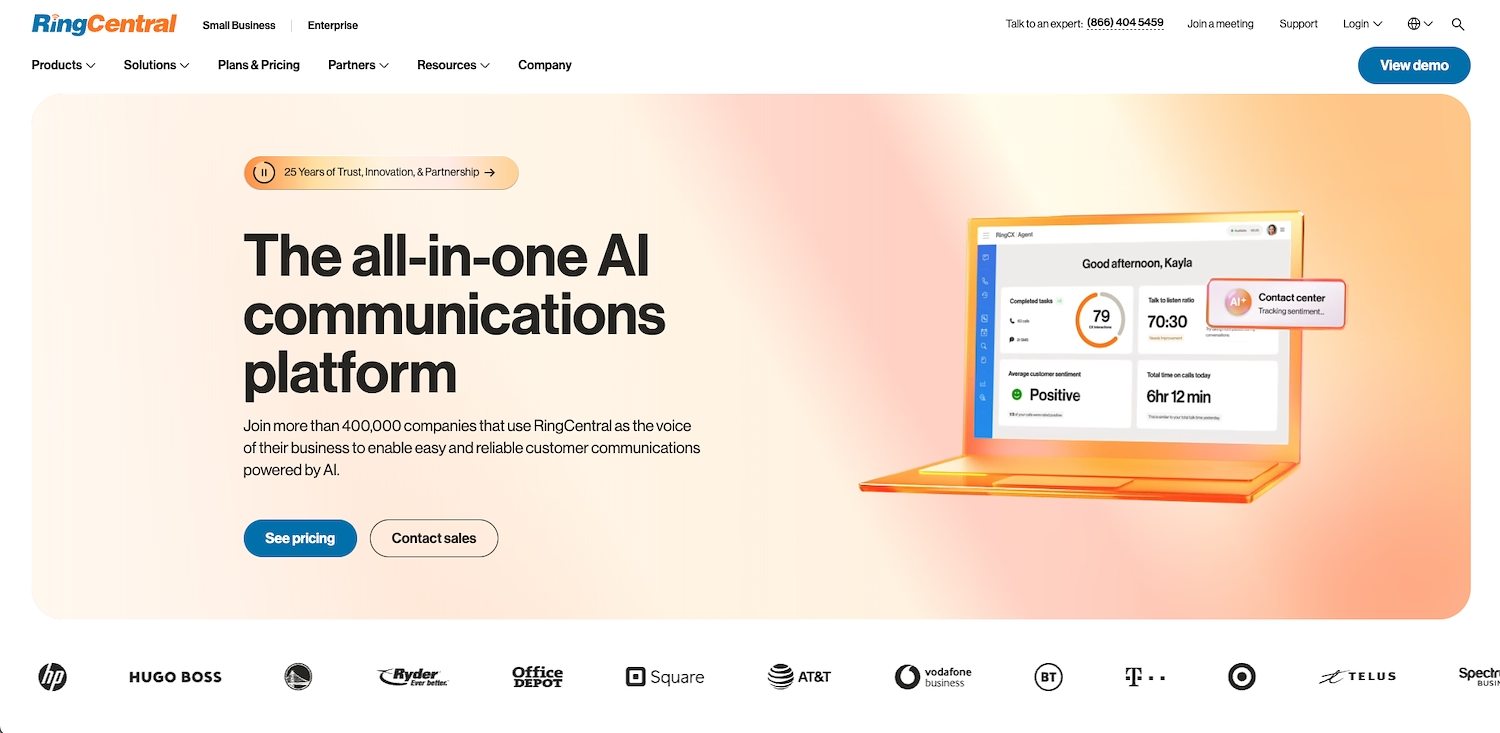
RingCentral MVP offers a single platform for business communications. It integrates phone calls, video meetings, and team chat. This approach allows a company to manage its main communication channels through one service. It is a choice for organizations that want to replace multiple separate tools with a unified solution.
RingCentral MVP's Main Features
- Provides video meetings as part of its unified platform.
- Includes team chat for internal company messaging.
- Combines phone calls with messaging and video in one application.
How RingCentral MVP Compares To Aircall
Average Review score: 4.0/5 stars based on 154 G2 reviews.
- RingCentral provides an omnichannel solution with over 30 digital channels, including social media and SMS, whereas Aircall is primarily a voice platform.
- It includes advanced AI options for self-service, like bots and Intelligent Virtual Agents, which are not native features in Aircall.
- The platform offers a fully integrated, AI-powered workforce engagement management solution, a feature set not found in Aircall's standard offering.
- Its system unifies phone, video, and team messaging in one application, while Aircall focuses on phone system capabilities and requires other tools for team chat or video.
Potential Drawbacks Compared To Aircall
- The platform's setup can be more complex than Aircall's. An implementation time of two months might be a drawback for teams that need a fast start.
- Its comprehensive feature set often comes with a higher price tag. This cost may not fit the budget of teams that only need the core voice features found in Aircall.
- Some users report issues with call functionality and quality. This can be a concern for teams that rely on consistent voice communication, a core focus of Aircall.
Pricing and Cost Considerations
RingCentral MVP is perceived as a premium-priced solution, which makes a direct comparison with Aircall's plans difficult without a custom quote. For the most accurate pricing, we recommend visiting the official website, as costs vary based on package and team size.
2) Dialpad Ai Voice
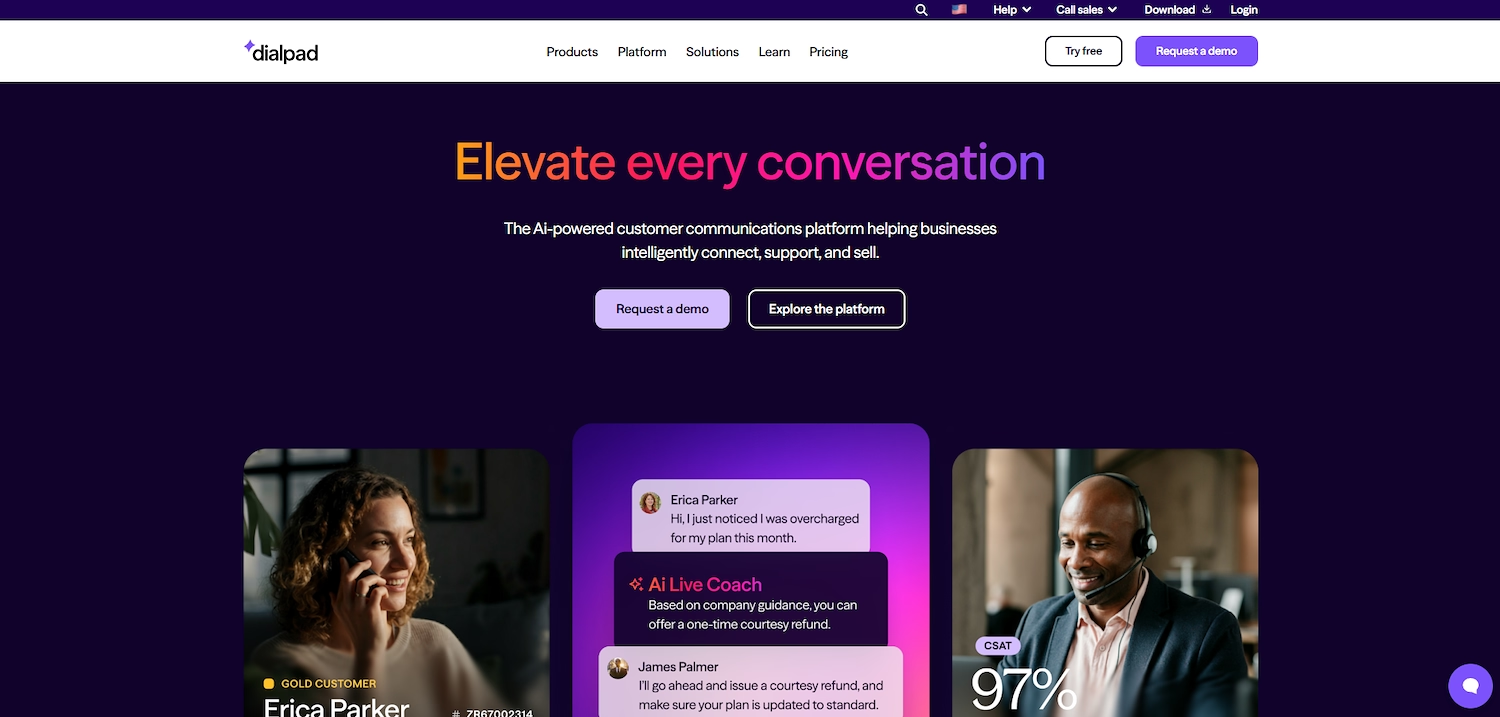
Dialpad Ai Voice is an AI-powered platform for customer communications. It combines phone calls, messages, video meetings, a contact center, and outbound sales tools into one cloud application. The system uses its own large language model for real-time transcriptions and summaries.
Companies use it to unify phone providers, boost sales performance, and cut call-handle duration. It serves over 30,000 customers in more than 70 countries.
Dialpad Ai Voice's Main Features
- Core AI layer provides real-time transcription, sentiment analysis, CSAT scoring, and automated action-item extraction.
- Outbound sales dialer includes real-time AI coaching, insights, and workflow automations.
- Contact center offers AI agents, live coaching assistants, and deep analytics.
- Combines voice, video, and messaging with instant AI summaries and action items.
How Dialpad Ai Voice Compares To Aircall
Average Review score: 4.4/5 stars based on 3,901 G2 reviews.
- Dialpad Ai Voice includes a native AI layer for real-time transcriptions and summaries. Aircall, in comparison, often uses third-party integrations for similar advanced AI functions.
- The platform unifies phone calls, video meetings, and messaging in one application. Aircall, by contrast, focuses on voice and requires other tools for video or team chat.
- This tool uses its own large language model, trained on extensive conversational data, for its AI features. This differs from Aircall, which typically integrates with more general AI services.
- It offers an outbound sales dialer with built-in AI coaching and live insights. Aircall provides a power dialer, but its real-time coaching is less native to the platform.
Potential Drawbacks Compared To Aircall
- Some administrators report a steeper learning curve with Dialpad's extensive features. This contrasts with Aircall, which is often selected for its simpler, more focused setup process.
- The platform sometimes experiences connection glitches or issues with call transfers, according to user feedback. Teams that prioritize consistent voice stability may find Aircall's dedicated phone system more reliable.
- Sporadic issues with call recording functionality are sometimes mentioned by users. This can be a drawback for teams that depend on flawless recording for training or compliance purposes.
Pricing and Cost Considerations
Dialpad Ai Voice offers a Standard plan at $15 per user per month when billed annually, providing a clear entry point. This can be an advantage over Aircall, as some users report its pricing model scales less effectively. For detailed costs, visit Dialpad Ai Voice's official website.
3) 8x8 Work
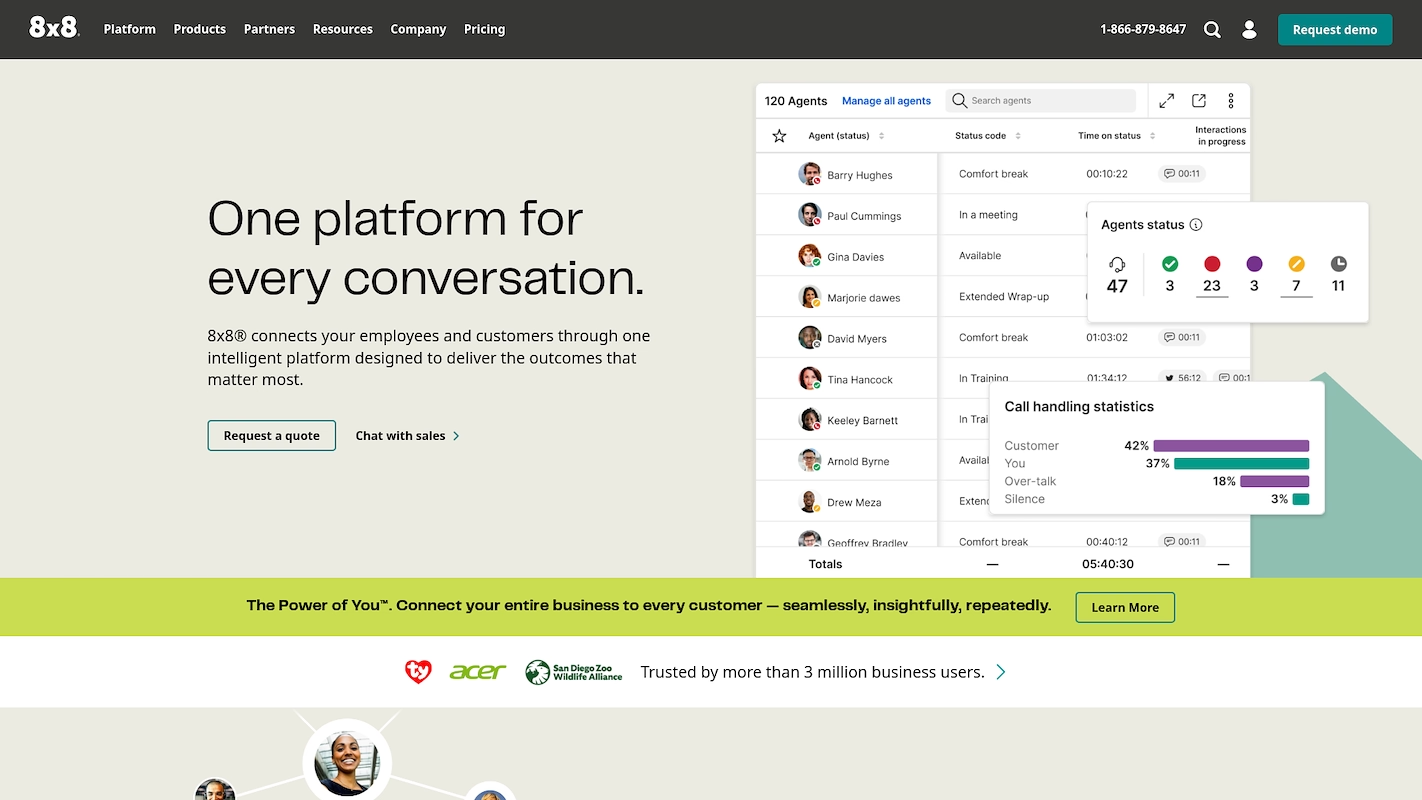
8x8 Work is a cloud communications platform that unifies contact-center, voice, video, and chat functions in a single stack. The system connects employees with customers to elevate the customer experience and increase operational efficiency.
It helps businesses modernize legacy systems and mitigate risk through secure, compliant communications. More than 3 million business users use its global infrastructure.
8x8 Work's Main Features
- Offers unified communications with AI-enabled voice, video, and chat for team messaging.
- Provides communications APIs for SMS, voice, and chat delivered from a single platform.
- Includes no-code and low-code administration with drag-and-drop workflows for self-service configuration.
- Extends customer experience tools to all customer-facing teams, not just contact center agents.
How 8x8 Work Compares To Aircall
Average Review score: 4.2/5 stars based on 765 G2 reviews.
- 8x8 Work combines voice, video, and chat into a single application, while Aircall focuses primarily on voice and requires other tools for team messaging or video meetings.
- The platform supports large video meetings for up to 500 participants and can live stream to YouTube, a native capability that Aircall does not offer.
- It provides a 99.999% uptime Service Level Agreement, offering a specific reliability guarantee that is not a standard feature of Aircall's plans.
- This tool includes built-in speech analytics and coaching features, whereas Aircall often uses third-party integrations to achieve similar advanced analytical functions.
Potential Drawbacks Compared To Aircall
- Some users find the interface more complex than Aircall's simple design. This might be a drawback for teams that want a tool with a very short learning curve.
- The platform's setup can take longer than Aircall's. Teams that need to get started quickly may find Aircall's faster implementation process more suitable.
- Its all-in-one system includes many features beyond voice. This can be overwhelming for teams that only need a dedicated phone system, where Aircall's focused approach is often preferred.
Pricing and Cost Considerations
8x8 Work is perceived as a premium-priced solution, and specific plan costs are not publicly listed, which makes a direct comparison with Aircall difficult without a custom quote. For the most accurate pricing, we recommend visiting 8x8 Work's official website, as costs vary based on your team's needs.
4) Talkdesk CX Cloud
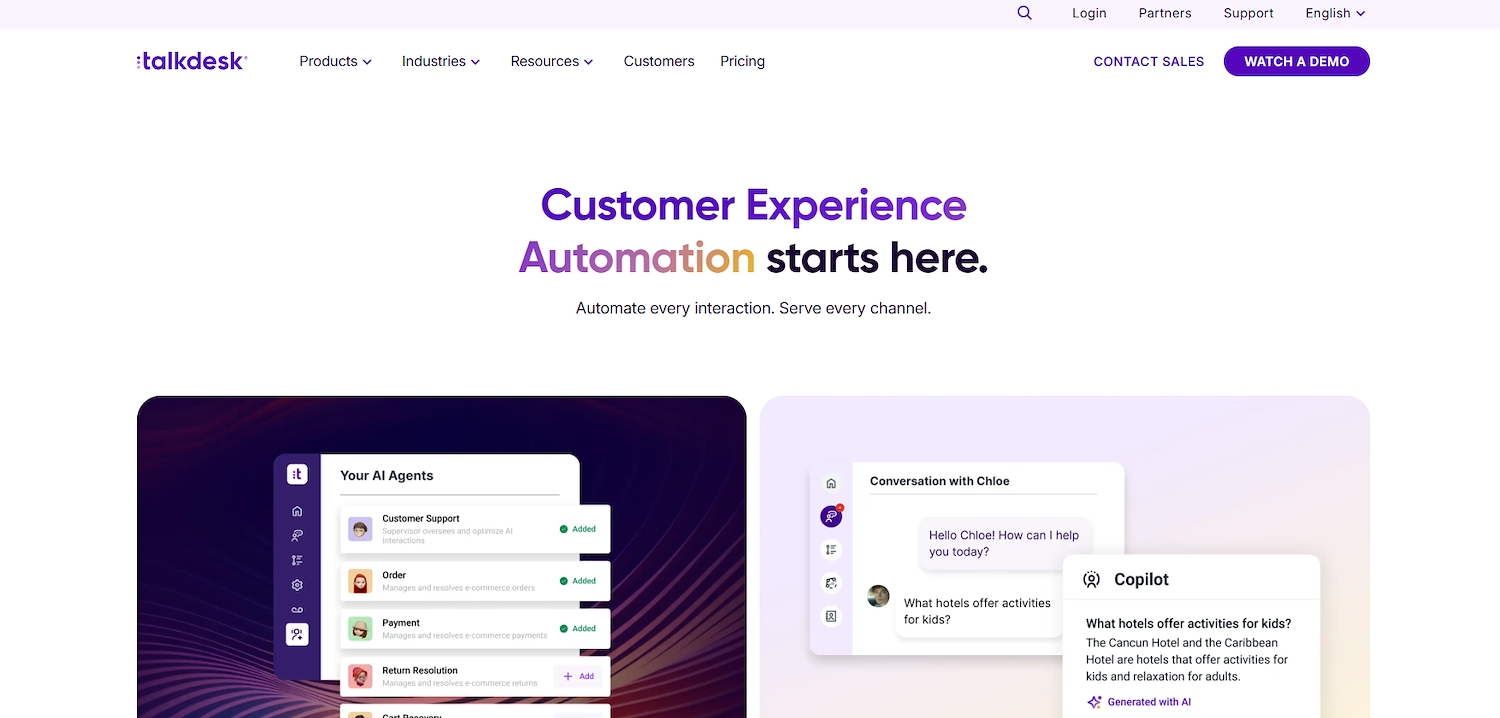
Talkdesk CX Cloud is a customer experience platform that provides cloud-based communication tools. Businesses use it to manage customer interactions across different channels. The system offers functions for teams that handle a high volume of calls and require phone dialer capabilities to connect with customers and prospects.
Talkdesk CX Cloud's Main Features
- Uses AI agents to automate the customer experience lifecycle from self-service to agent-assisted engagements.
- Provides voice and biometric authentication for identity verification and fraud prevention.
- Includes low-code tools that allow users to tune and govern the platform's AI models.
- Offers SDKs and pre-built components to embed contact-center functions into proprietary applications.
How Talkdesk CX Cloud Compares To Aircall
Average Review score: 4.4/5 stars based on 2,431 G2 reviews.
- Talkdesk provides native Customer Experience Automation (CXA) to manage customer journeys with AI agents, while Aircall typically requires third-party tools for similar complex automation.
- It offers prebuilt AI agents for specific industries like healthcare and finance, which is different from Aircall's more general approach to sales and support functions.
- The platform uses its own data cloud to give its AI agents full context from call recordings and CRM records; Aircall, in contrast, integrates with external AI services that may not have this unified data access.
- This tool manages customer interactions across multiple channels natively, an approach that differs from Aircall, which is built primarily as a voice-focused platform.
Potential Drawbacks Compared To Aircall
- Some users find the platform's extensive features can make its setup more complex. This is different from Aircall, which is often chosen for its simple and fast implementation.
- The tool is a full customer experience suite, which may be more than what some teams need. Aircall's dedicated focus on voice is often a better fit for teams that do not require broad CX automation tools.
- Its pricing structure reflects its broad capabilities, which may not suit teams whose budget aligns more with a dedicated phone system like Aircall.
Pricing and Cost Considerations
Talkdesk CX Cloud has transparent pricing, with plans starting at $85 per user per month. This clear cost structure can be an advantage over Aircall, whose pricing is not publicly listed. For the most accurate costs, visit Talkdesk CX Cloud's official website.
5) Five9
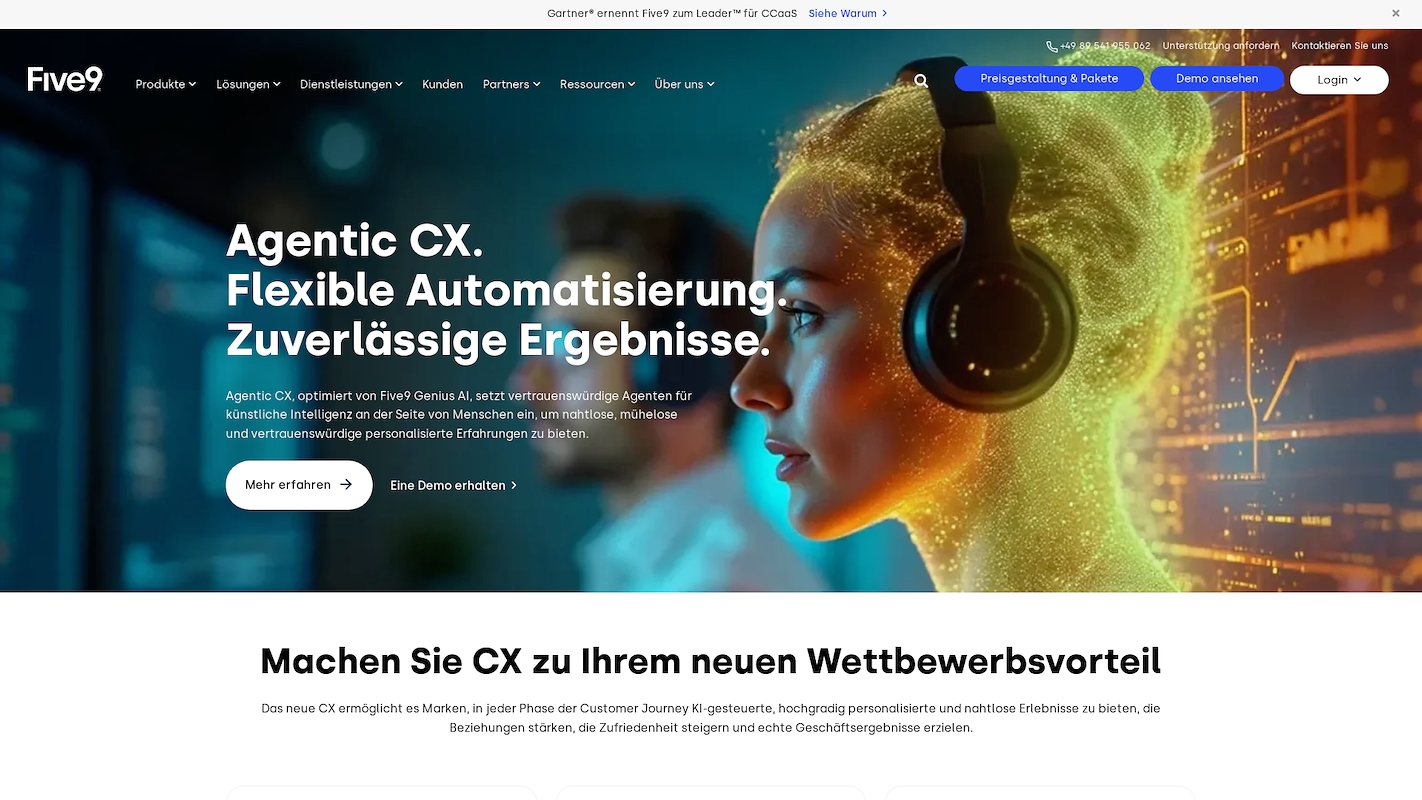
Five9 is a cloud platform for contact centers. It provides software to manage customer interactions and includes a phone dialer for outbound campaigns. Businesses use it to connect with customers, oversee agent performance, and automate communication tasks for blended inbound and outbound operations.
Five9's Main Features
- Offers a GenAI Studio that allows users to build and deploy custom virtual agents.
- Includes an employee engagement suite with tools for workforce management, quality management, and gamification.
- Provides a 99.999% uptime Service Level Agreement for its intelligent CX platform.
- Features AI Trust and Governance safeguards for the responsible use of its AI capabilities.
How Five9 Compares To Aircall
Average Review score: 4.1/5 stars based on 533 G2 reviews.
- Five9 handles voice, email, and social media interactions within one platform. Aircall, in contrast, focuses mainly on voice and requires other tools for different channels.
- The platform includes a GenAI Studio to build custom virtual agents for automation. This is a native feature, while Aircall typically relies on third-party integrations for similar AI capabilities.
- It offers a native employee engagement suite with tools for workforce management and gamification. Aircall does not include these specific features in its core product.
- This tool provides a 99.999% uptime Service Level Agreement (SLA), which offers a specific reliability guarantee that is not a standard part of Aircall's plans.
Potential Drawbacks Compared To Aircall
- Five9's setup can be more complex and sometimes requires specialized knowledge. This is different from Aircall, which teams often select for its simpler implementation.
- Some users find its user interface less intuitive than Aircall's modern design. The platform's admin tool can feel outdated to teams accustomed to newer interfaces.
- The tool is a comprehensive contact center suite. This might be more than what is necessary for teams that only need a dedicated phone system, where Aircall's focused approach is often a better fit.
Pricing and Cost Considerations
Five9 is considered a premium-priced solution, so a direct comparison with Aircall's plans requires a custom quote. For the most accurate pricing information, we recommend visiting Five9's official website.
Automate Sales with 11x Digital Workers
If your sales strategy includes digital workers, explore what 11x offers. The platform uses autonomous agents for prospect outreach and lead qualification. This is a focused solution for companies wanting to automate specific sales tasks without replacing their entire communication stack.
With 11x, we use AI to manage your sales process. Our agent Alice identifies accounts and handles outreach, while Julian qualifies leads and books meetings. This approach replaces multiple tools in a traditional GTM stack, consolidating functions into one platform.
Book a demo to see 11x in action.
6) CloudTalk
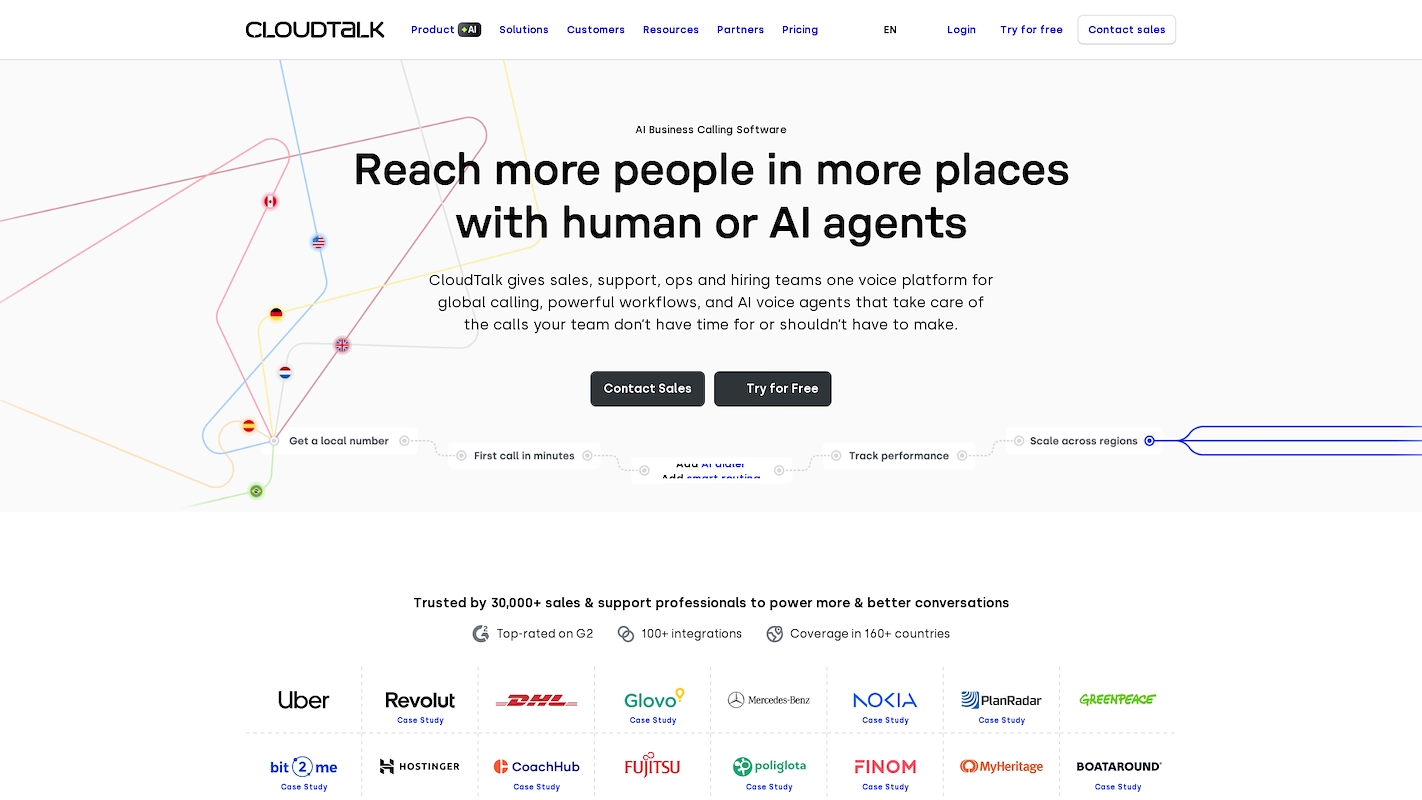
CloudTalk is a cloud phone system for sales and customer service teams. The platform offers a phone dialer to automate outbound campaigns and supports integrations with CRM and helpdesk software. Businesses use it to handle customer interactions through a centralized tool for their call-based operations.
CloudTalk's Main Features
- Offers AI voice agents to handle both inbound and outbound calls on a 24/7 basis.
- Includes an AI Sales Dialer with preview, power, and parallel modes for outbound campaigns.
- Provides integrated SMS and WhatsApp messaging for automated customer follow-ups.
- Features live call monitoring with whisper and barge-in capabilities for real-time agent coaching.
How CloudTalk Compares To Aircall
Average Review score: 4.4/5 stars based on 1,384 G2 reviews.
- CloudTalk provides native AI voice agents to handle calls 24/7. This is different from Aircall, which often needs third-party integrations for similar automation.
- The platform includes an AI Sales Dialer with preview, power, and parallel modes. Aircall offers a power dialer, but CloudTalk gives teams more varied options for outbound campaigns.
- It supports integrated SMS and WhatsApp messaging for customer follow-ups. This contrasts with Aircall, which focuses mainly on voice and may require other tools for text channels.
- This tool features live call monitoring with whisper and barge-in functions for agent coaching. While Aircall has call monitoring, CloudTalk's real-time coaching tools are a core part of its system.
Potential Drawbacks Compared To Aircall
- Aircall is often noted for its simple and modern user interface. Some users report that CloudTalk's extensive feature set can present a steeper learning curve for teams that prefer a more straightforward design.
- Some users report occasional call quality or connection issues with CloudTalk. Teams that need very consistent voice stability might find Aircall's dedicated focus on its phone system to be a more reliable option.
- The tool sometimes experiences integration issues with certain CRMs, according to user feedback. This differs from Aircall, which is often selected for its smooth and reliable integrations with major sales and support platforms.
Pricing and Cost Considerations
CloudTalk offers transparent pricing, with plans starting at $19 per user per year. This clear cost structure is an advantage over Aircall, which does not publicly list its prices and requires a custom quote. For the most accurate costs, visit CloudTalk's official website.
7) Freshdesk Contact Center
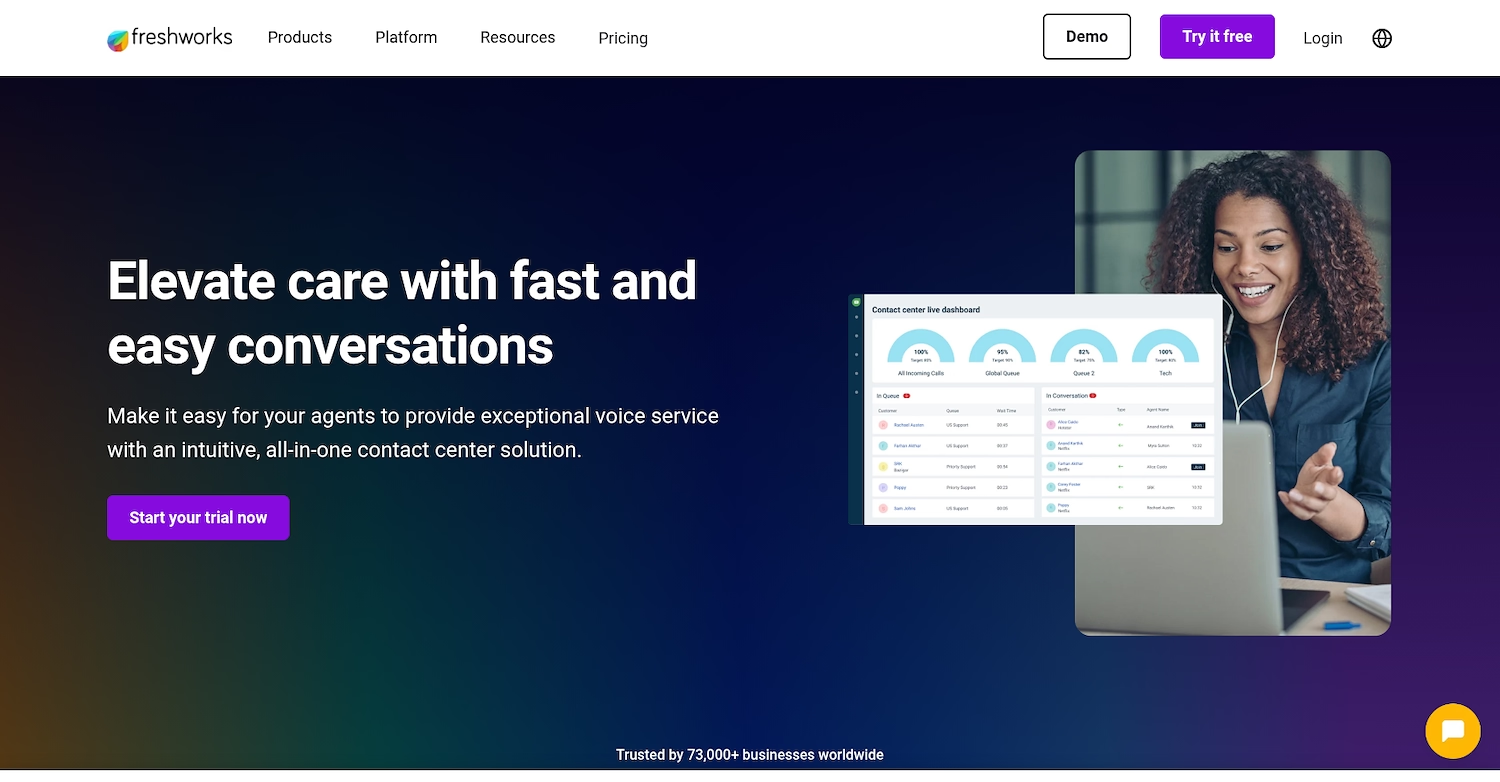
Freshdesk Contact Center is a cloud-based phone system for customer service and sales teams. It is part of the Freshworks product suite. Businesses use the platform to manage customer calls and support interactions through a central tool.
The system includes a phone dialer to help teams connect with customers and prospects. This function supports outbound communication campaigns for sales and support departments.
Freshdesk Contact Center's Main Features
- Integrates into the Freshworks product suite to unify customer service tools.
- Provides a phone dialer to assist with outbound communication campaigns.
- Manages customer calls and support interactions within a single platform.
How Freshdesk Contact Center Compares To Aircall
Average Review score: 4.1/5 stars based on 142 G2 reviews.
- Freshdesk Contact Center provides a free plan, which is suitable for teams on a tight budget. This contrasts with Aircall, which does not offer a free version and has non-public pricing.
- The platform is part of the Freshworks ecosystem, offering deep integration with other Freshworks products. Aircall, in comparison, operates as a standalone tool that integrates with various external systems.
- It handles both voice and email communications natively. This multi-channel approach is different from Aircall's primary focus on voice services.
- This tool offers local phone numbers in more than 90 countries. This specific global reach provides more options for international businesses than Aircall's standard setup.
Potential Drawbacks Compared To Aircall
- Some users find that Aircall offers more seamless integrations with a wider range of third-party CRMs. Freshdesk Contact Center, in contrast, works best within its own Freshworks product suite, which can be a limitation for teams that rely on other systems.
- Aircall is often chosen for its simple and intuitive user interface. In comparison, Freshdesk Contact Center is part of a larger product ecosystem, which can sometimes feel less straightforward for teams that only need a dedicated phone system.
- The tool's features are part of a broader customer service platform, unlike Aircall, which specializes only in voice communication. Teams that need a highly focused phone system may find Aircall's dedicated approach more suitable for their specific needs.
Pricing and Cost Considerations
Freshdesk Contact Center provides transparent pricing, with a free plan and paid tiers starting at $15 per user per month. This offers a clear cost advantage over Aircall, which does not publicly list its prices and requires a custom quote. For detailed costs, visit the Freshdesk Contact Center's official website.
8) Nextiva
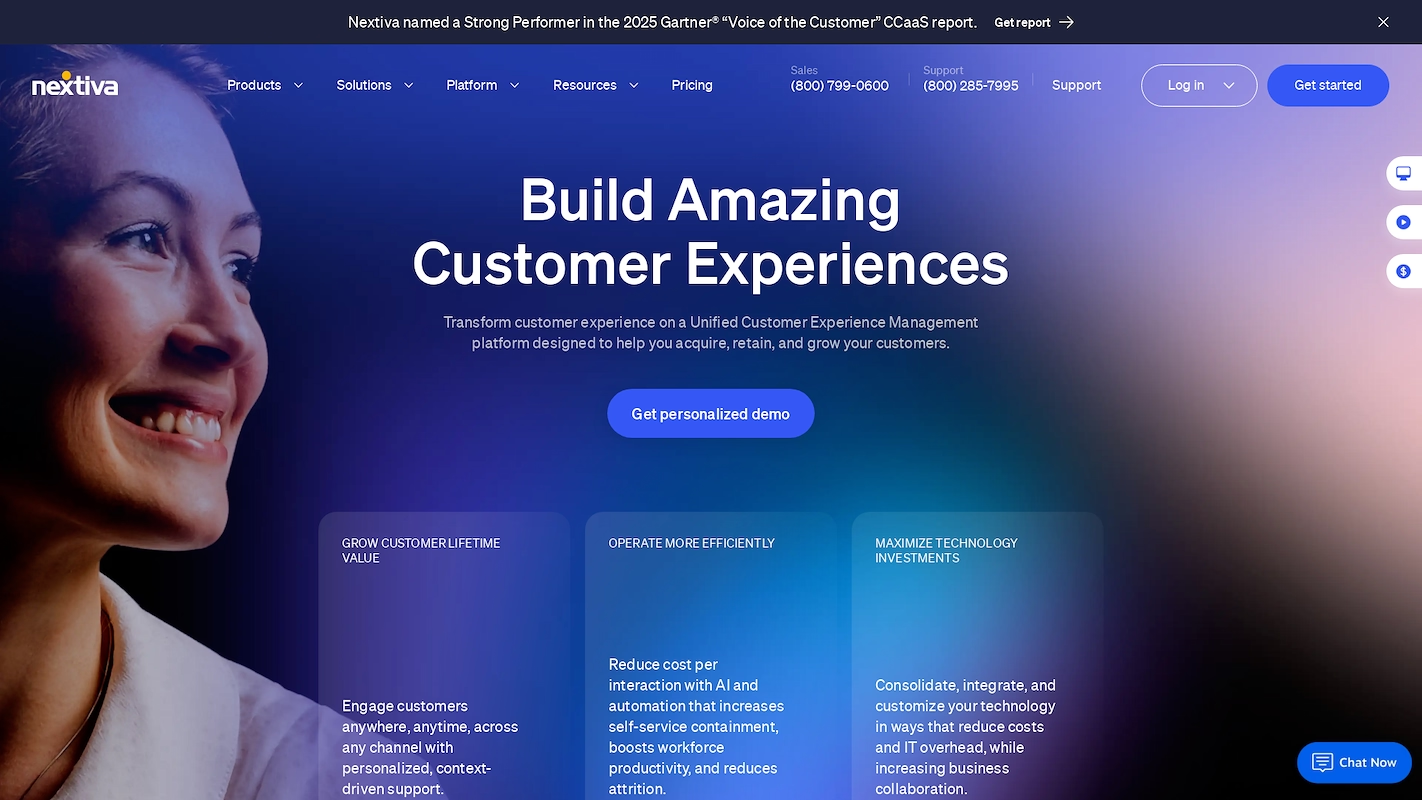
Nextiva provides a communication platform for businesses. The service offers phone dialer functions to connect with customers. Companies use it to manage their communication workflows for sales and support activities.
Nextiva's Main Features
- Offers basic communication tools, including phone calls, video calls, and instant messaging.
- Includes advanced features such as hold music, automated attendants, and a VoIP number.
- Provides multiple access methods through software pairing, a browser extension, or an individual download.
- Features reporting and dashboards for administrative oversight of communication activities.
How Nextiva Compares To Aircall
Average Review score: 4.5/5 stars based on 3,333 G2 reviews.
- Nextiva combines phone calls, video, and instant messaging into a single application, while Aircall is primarily a voice platform that requires integrations for other communication types.
- The platform provides HIPAA-compliant communication, a specific feature for industries like healthcare that is not a standard part of Aircall's service.
- It includes advanced call management tools like automated attendants, which allow for more complex call routing compared to Aircall's more straightforward system.
- This tool offers a virtual fax feature, supporting businesses that use fax communications, a function not natively available in Aircall.
Potential Drawbacks Compared To Aircall
- Some users find Nextiva's interface less intuitive than Aircall's modern design. This can be a factor for teams that want a tool with a very short learning curve, where Aircall's simplicity is often a key advantage.
- The platform sometimes requires contacting support for configuration changes. Aircall, in contrast, generally provides more self-service options, which allows teams to make adjustments without assistance.
- Aircall is often selected for its deep and reliable integrations with a wide range of CRMs. Nextiva's integrations may not be as extensive, which can be a consideration for sales teams that depend on a seamless connection to their specific CRM.
Pricing and Cost Considerations
Nextiva offers transparent pricing, with plans starting at $20 per user per month. This provides a clear cost structure, which is an advantage over Aircall's model that requires a custom quote. For detailed costs, we recommend visiting Nextiva's official website.
9) Grasshopper
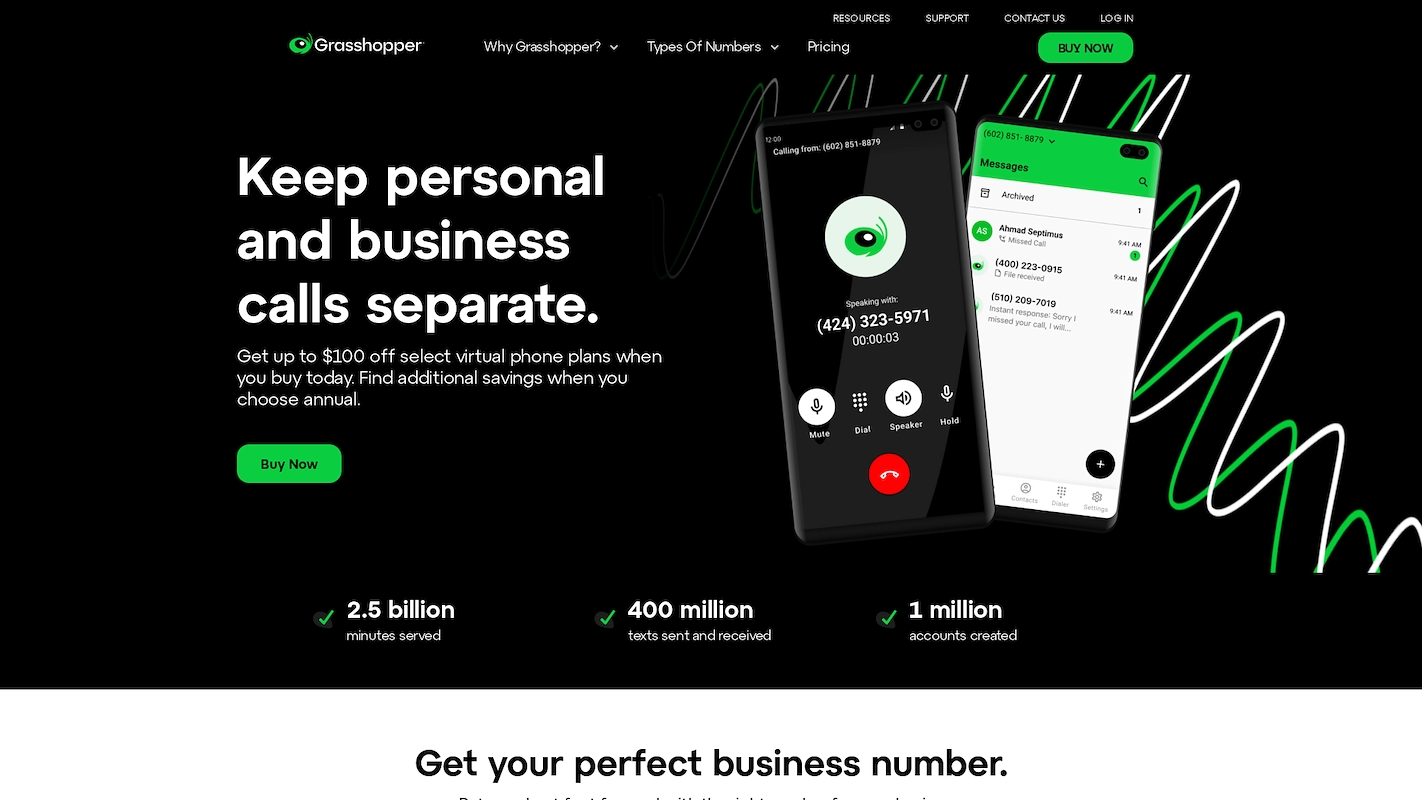
Grasshopper offers a virtual phone system built for small businesses and solo entrepreneurs. It adds a business number to an existing personal phone, which keeps work and private calls separate. The system helps a company present a professional front without extra hardware. It includes functions like call forward and custom welcome messages. This solution fits small teams that require a business number with core phone features.
Grasshopper's Main Features
- Offers basic communication tools, including phone calls, instant messaging, and conference calls.
- Provides advanced features such as hold music and automated attendants for call management.
- Allows access through software pairing, a browser extension, or an individual application download.
- Includes a VoIP number as part of its service package.
How Grasshopper Compares To Aircall
Average Review score: 3.9/5 stars based on 154 G2 reviews.
- Grasshopper provides a virtual phone system for small businesses that adds a business line to a personal phone, which is different from Aircall's per-user system built for teams.
- The platform allows you to choose a vanity phone number for branding, an option not standard in Aircall's service.
- It uses flat-rate monthly plans that include unlimited extensions, which contrasts with Aircall's per-user pricing model.
- This tool includes unlimited business texting as a core feature, while Aircall focuses primarily on voice and often requires other tools for messaging.
Potential Drawbacks Compared To Aircall
- Grasshopper is designed for small businesses and lacks advanced team features. In contrast, Aircall offers call monitoring, whispering, and shared inboxes, which are built for collaborative sales and support workflows.
- The tool does not include a power dialer for outbound campaigns. This is a key difference from Aircall, which provides this function to help sales teams increase their call volume and efficiency.
- It offers limited analytics for team performance. Aircall provides detailed dashboards to track metrics like call volume and wait times, giving managers more oversight of team activities.
Pricing and Plan Comparison
Grasshopper offers transparent, flat-rate plans starting at $14 per month, which contrasts with Aircall's per-user model that requires a custom quote. This makes Grasshopper a more predictable choice for small businesses. For detailed costs, visit Grasshopper's official website.
10) GoTo Connect
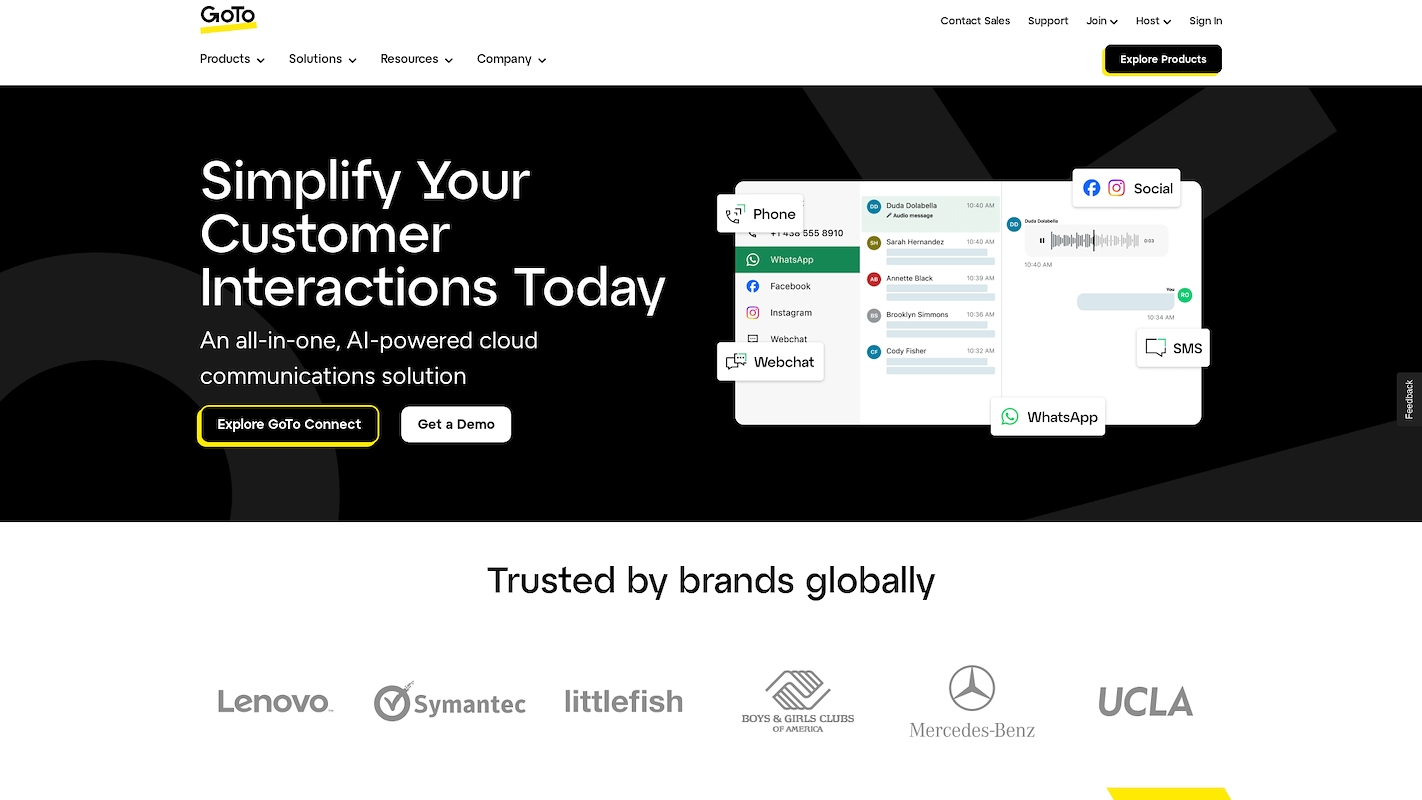
GoTo Connect is a business communication platform. It unifies phone calls, video conferences, and team chat in one application. Companies use it to manage customer communication and internal collaboration. The system offers a phone dialer for sales and support teams to handle outbound calls.
GoTo Connect's Main Features
- Unifies phone calls, video calls, and instant messaging within a single platform.
- Includes advanced features such as hold music and automated attendants for call management.
- Offers multiple access methods through software pairing, a browser extension, or an individual application download.
- Provides both voice and video conferencing capabilities.
How GoTo Connect Compares To Aircall
Average Review score: 4.4/5 stars based on 1,339 G2 reviews.
- GoTo Connect combines phone, video, and messaging in one application, while Aircall focuses on voice and requires other tools for video or chat.
- The platform offers a 99.999% uptime Service Level Agreement, which provides a specific reliability guarantee not standard in Aircall's plans.
- It includes a built-in AI Receptionist to automate call routing, whereas Aircall typically needs third-party apps for similar AI functions.
- This tool provides a visual dial plan editor to create custom call flows, offering more advanced configuration than Aircall's standard routing setup.
Potential Drawbacks Compared To Aircall
- Some users find the user interface less intuitive than Aircall's. Teams that want a tool with a very short learning curve might prefer Aircall's simple design, which is a key reason for its selection.
- The platform's integrations are effective but may not be as extensive as Aircall's. Aircall is known for its wide range of native connections to various specialized sales and support CRMs.
- Its outbound calling tools are part of a larger contact center suite. Aircall, in comparison, offers a dedicated power dialer designed for sales productivity, which can be a more direct solution for high-volume outreach.
Pricing and Cost Considerations
GoTo Connect offers transparent pricing, with plans starting at $27 per user per month. This provides clear cost predictability, an advantage over Aircall's model, which requires a custom quote. For detailed costs, visit GoTo Connect's official website.
Which One Should You Go With?
The right Aircall alternative depends on many factors, like team size, budget, and specific needs. This guide shared several options to help you make a decision that fits your requirements.
If your goal is to automate sales tasks, consider 11x. The platform uses autonomous agents to find prospects, handle outreach, and qualify inbound leads. This approach consolidates several sales tools into a single solution for GTM teams.




